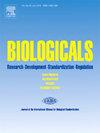Mass spectrometry analysis of bovine tuberculins - 3R potential in batch potency testing
IF 1.5
4区 生物学
Q4 BIOCHEMICAL RESEARCH METHODS
引用次数: 0
Abstract
Tuberculin purified protein derivatives (tuberculin PPDs) are heat-treated, protein-enriched products of lysed mycobacteria. Tuberculin PPDs reveal a delayed hypersensitivity in individuals earlier sensitized to mycobacteria and are thereby used to detect tuberculosis. For batch potency testing of tuberculins, the European Pharmacopoeia advises intradermal injection of products into previously sensitized guinea pigs. Batch potency is reflected by the size of the resulting skin lesions as compared to a reference tuberculin. This procedure is quite compromising and results are highly variable, often requiring test repeats. In a proof of concept study, we evaluated the suitability of a combination of liquid chromatography and mass spectrometry (LC-MSE) to record qualitative protein profiles of bovine PPD tuberculin concentrates. Six batches of bovine PPD tuberculin concentrates from three manufacturers and the WHO International Standard for PPD of Mycobacterium bovis tuberculin were studied. In total, 35 proteins were identified by LC-MSE followed by MS database search. Eight proteins were consistently found in all batches of all bovine tuberculin PPD products. Our results suggest that LC-MSE can be used for the analysis of PPD tuberculin concentrates and that it can be further developed in the future into quantitative MS methods for batch analysis, i.e. consistency testing.
牛结核菌素- 3R电位在批效检测中的质谱分析
结核菌素纯化蛋白衍生物(结核菌素PPDs)是经过热处理、富含蛋白质的裂解分枝杆菌产物。结核菌素ppd在早期对分枝杆菌敏感的个体中显示出延迟的超敏反应,因此用于检测结核病。对于结核菌素的批量效价测试,欧洲药典建议将产品皮内注射到先前致敏的豚鼠体内。与参考结核菌素相比,批量效力反映在所产生的皮肤病变的大小上。这个过程是相当妥协的,结果是高度可变的,经常需要重复测试。在一项概念验证研究中,我们评估了液相色谱和质谱(LC-MSE)结合记录牛PPD结核菌素浓缩物的定性蛋白质谱的适用性。对三家生产企业生产的6批牛PPD结核菌素浓缩液和世界卫生组织牛结核杆菌PPD国际标准进行了研究。LC-MSE共鉴定了35个蛋白,并进行了MS数据库检索。在所有批次的牛结核菌素PPD产品中一致发现了8种蛋白质。我们的结果表明,LC-MSE可以用于PPD结核菌素浓缩物的分析,并且可以在未来进一步发展为批量分析的定量MS方法,即一致性测试。
本文章由计算机程序翻译,如有差异,请以英文原文为准。
求助全文
约1分钟内获得全文
求助全文
来源期刊

Biologicals
生物-生化研究方法
CiteScore
3.70
自引率
0.00%
发文量
39
审稿时长
48 days
期刊介绍:
Biologicals provides a modern and multidisciplinary international forum for news, debate, and original research on all aspects of biologicals used in human and veterinary medicine. The journal publishes original papers, reviews, and letters relevant to the development, production, quality control, and standardization of biological derived from both novel and established biotechnologies. Special issues are produced to reflect topics of particular international interest and concern.Three types of papers are welcome: original research reports, short papers, and review articles. The journal will also publish comments and letters to the editor, book reviews, meeting reports and information on regulatory issues.
 求助内容:
求助内容: 应助结果提醒方式:
应助结果提醒方式:


